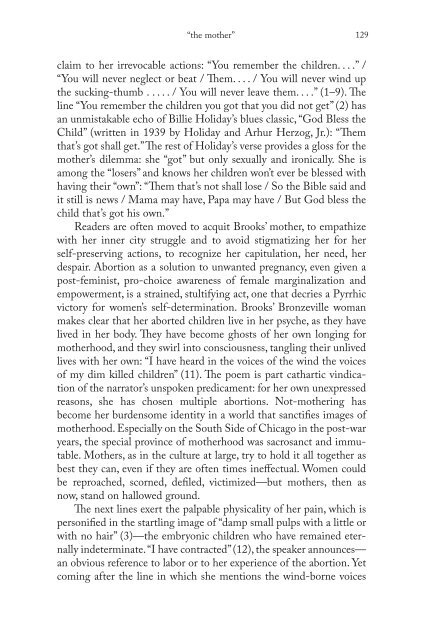Bloom's Literary Themes - ymerleksi - home
Bloom's Literary Themes - ymerleksi - home
Bloom's Literary Themes - ymerleksi - home
Create successful ePaper yourself
Turn your PDF publications into a flip-book with our unique Google optimized e-Paper software.
“the mother” 129<br />
claim to her irrevocable actions: “You remember the children. . . .” /<br />
“You will never neglect or beat / Them. . . . / You will never wind up<br />
the sucking-thumb . . . . . / You will never leave them. . . .” (1–9). The<br />
line “You remember the children you got that you did not get” (2) has<br />
an unmistakable echo of Billie Holiday’s blues classic, “God Bless the<br />
Child” (written in 1939 by Holiday and Arhur Herzog, Jr.): “Them<br />
that’s got shall get.” The rest of Holiday’s verse provides a gloss for the<br />
mother’s dilemma: she “got” but only sexually and ironically. She is<br />
among the “losers” and knows her children won’t ever be blessed with<br />
having their “own”: “Them that’s not shall lose / So the Bible said and<br />
it still is news / Mama may have, Papa may have / But God bless the<br />
child that’s got his own.”<br />
Readers are often moved to acquit Brooks’ mother, to empathize<br />
with her inner city struggle and to avoid stigmatizing her for her<br />
self-preserving actions, to recognize her capitulation, her need, her<br />
despair. Abortion as a solution to unwanted pregnancy, even given a<br />
post-feminist, pro-choice awareness of female marginalization and<br />
empowerment, is a strained, stultifying act, one that decries a Pyrrhic<br />
victory for women’s self-determination. Brooks’ Bronzeville woman<br />
makes clear that her aborted children live in her psyche, as they have<br />
lived in her body. They have become ghosts of her own longing for<br />
motherhood, and they swirl into consciousness, tangling their unlived<br />
lives with her own: “I have heard in the voices of the wind the voices<br />
of my dim killed children” (11). The poem is part cathartic vindication<br />
of the narrator’s unspoken predicament: for her own unexpressed<br />
reasons, she has chosen multiple abortions. Not-mothering has<br />
become her burdensome identity in a world that sanctifies images of<br />
motherhood. Especially on the South Side of Chicago in the post-war<br />
years, the special province of motherhood was sacrosanct and immutable.<br />
Mothers, as in the culture at large, try to hold it all together as<br />
best they can, even if they are often times ineffectual. Women could<br />
be reproached, scorned, defiled, victimized—but mothers, then as<br />
now, stand on hallowed ground.<br />
The next lines exert the palpable physicality of her pain, which is<br />
personified in the startling image of “damp small pulps with a little or<br />
with no hair” (3)—the embryonic children who have remained eternally<br />
indeterminate. “I have contracted” (12), the speaker announces—<br />
an obvious reference to labor or to her experience of the abortion. Yet<br />
coming after the line in which she mentions the wind-borne voices
















